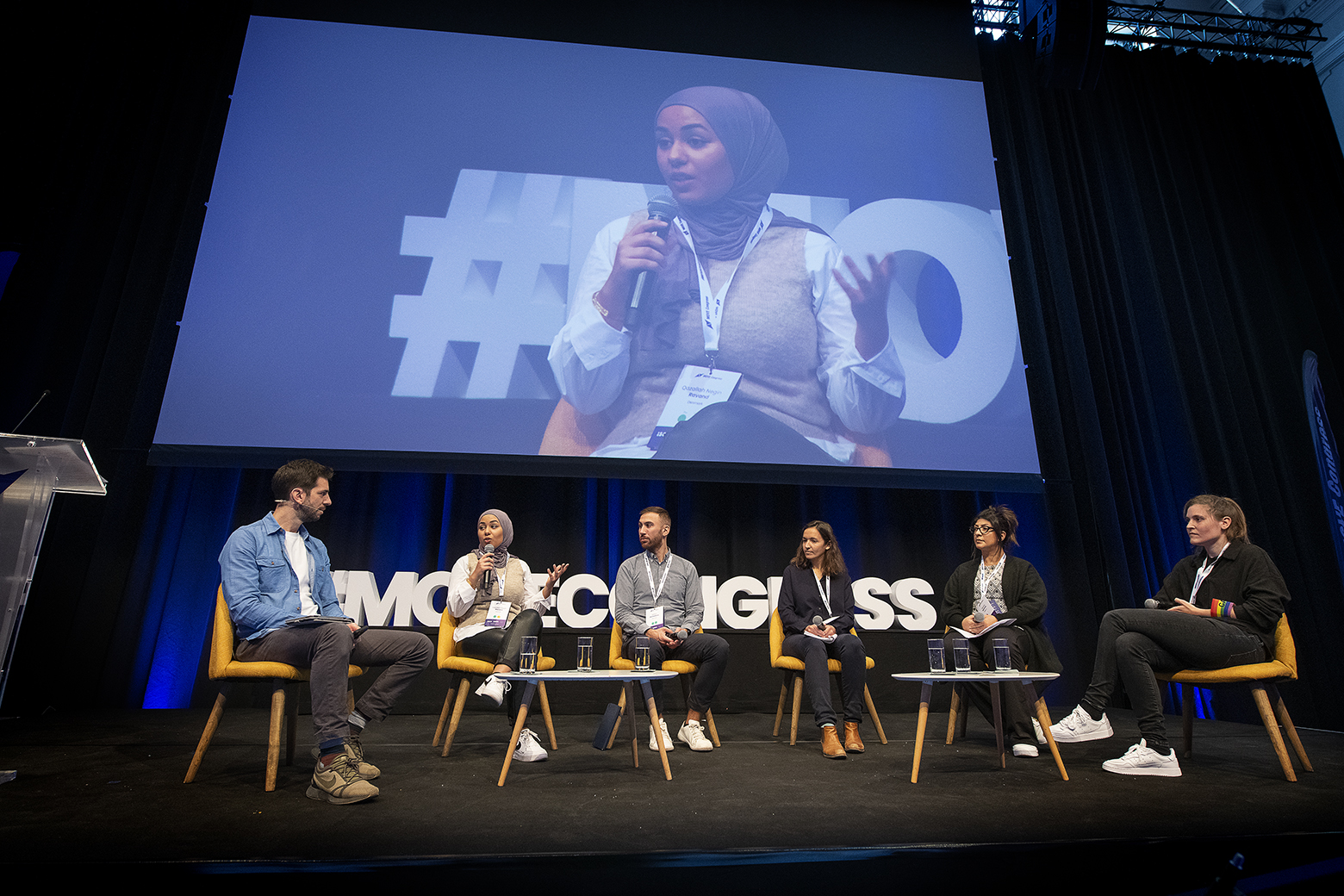
Nothing about us without us: Why sport needs more diverse decision-makers as it bounces back from the pandemic
The MOVE Congress 2021 plenary session on 18 November featured a discussion panel of experts voicing the points of view of people who are typically – and often systemically – excluded from sport and physical activity. We put inclusion in the “sportlight” and asked why sport has failed to provide safe and inclusive spaces for girls and women, refugees and migrants, people with disabilities and LGBTQI+ participants in the past and how we can take things that we’ve learned during the pandemic to innovate in our projects and initiatives.
Daniel Cade, an international consultant specialising sport governance and sustainability at both the elite and grassroots levels, introduced the panel, which included #BeActive Local Hero Award nominee Nagin Ravand, Paralympic Committee performance and development manager Dillon Richardson, FB Barca Foundation international programme manager Lucy Mills, urban design expert and mental wellbeing activist Rozina Spinnoy, and Belgian youth LGBTQI+ NGO founder Arlena Darragas from Out for the Win.
Bringing inclusion into the context of the Covid-19 outbreak, Cade pointed out that the pandemic has “acted like a magnifying glass” that has not only exacerbated the problems of exclusion and isolation among vulnerable groups, but has, importantly, raised awareness of the link between physical activity, health, and social and societal opportunity that desperately needs more attention.
“Some have observed that we’ve had a ‘syndemic’, so sort of a systemic pandemic,” Cade explained. “A syndemic is where those that have underlying health conditions are more exposed to the virus and as a result of that those that have underlying health conditions are those have underlying social determinants such as disabilities, ethnicity and lower income. So what does this mean? It means that sport has a role to play here; sport has a role to address the intersectionality of these issues that are causing health problems in our society today.”
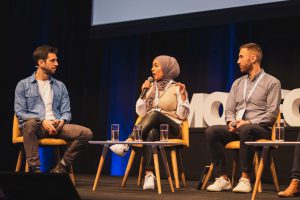 Nagin Ravand noted that the lockdowns had not only a negative, but also a positive impact on the women and girls participating in the activities she was working on – on the one hand restricting them from the game they loved (football), and on the other helping her to design better and more inclusive activities for when they could return.
Nagin Ravand noted that the lockdowns had not only a negative, but also a positive impact on the women and girls participating in the activities she was working on – on the one hand restricting them from the game they loved (football), and on the other helping her to design better and more inclusive activities for when they could return.
“For my neighbourhood the pandemic, and all of the balls in the air that it throws, stopped time and made sure that we could catch up; that we had time to build what was not already there and to give the opportunities that were not already given,” Ravand said. “It made sure people could stand still and take time to look up and think ok, who [is being left] behind?”
From the perspective of working in high performance sport and recreational sport for people with disabilities, Dillon Richardson noticed the obvious shift towards a preoccupation with safety measures to combat the virus. He would like this attention to expand to address broader health and wellbeing needs as we rebuild.
“[During the pandemic] many of us had to rethink physical safety or how to have hand washing stations or things like this. But hopefully in the future it could allow you to have this lens of creating a safe space, redesigning our programmes and how they’re implemented, not only for physical safety in combating Covid, but addressing social, psychological and physical safety beyond Covid.”
Obsolete sport systems force people to tick a box
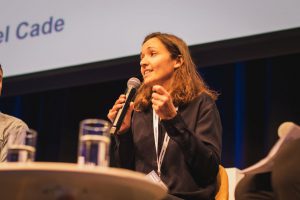 Lucy Mills from FC Barca Foundation believes we also need to update our way of seeing how sport can be delivered, particularly in informal spaces and non-traditional ways. Although football has a long history of firmly embedded (masculine) traditions, her work through the foundation is tackling biases and inequalities imposed on women and girls and people from refugee backgrounds through systemic exclusion.
Lucy Mills from FC Barca Foundation believes we also need to update our way of seeing how sport can be delivered, particularly in informal spaces and non-traditional ways. Although football has a long history of firmly embedded (masculine) traditions, her work through the foundation is tackling biases and inequalities imposed on women and girls and people from refugee backgrounds through systemic exclusion.
“There are conscious and unconscious biases [in sport] underpinned by factless and inaccurate biases, perceptions and understandings of people in society,” she noted. “We have a rigid sport structure that historically has been binary, that was designed by and for men many years ago. And of course this system is changing slowly and many of you in the room are driving this change. But it goes back to the design of projects… and challenging ourselves at listening and understanding those biases.”
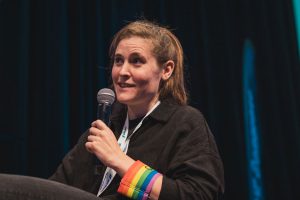 Arlena Darragas agreed that the way in which sport is organised in a binary way for “men” and “women” automatically excluded many of the young people she works with who do not feel comfortable identifying with either category or may be transgender.
Arlena Darragas agreed that the way in which sport is organised in a binary way for “men” and “women” automatically excluded many of the young people she works with who do not feel comfortable identifying with either category or may be transgender.
“You’re forced to choose a box [to participate],” she said, adding that a “horrifying” proportion of LGBTQI+ participants feel insecure or scared when participating in mainstream sports.
“Within the LGBTQI community we have a lot of different groups that all have something to do with sexuality, with gender, with expression and with how a body looks,” she said. “I’m sure everyone knows that there is still a problem in sport for that community but I don’t think everyone knows how big this problem really is. In Europe more than 90% of young LGBTQI athletes can’t be fully themselves in sports… It’s not just a problem that exists in their heads, it’s existing because they are afraid, because there’s just an unsafe situation in sport for a lot of them.”
Bring more voices to the table
Achieving more inclusion in sport is not just about bringing more participants onto the playing field or members into clubs, it’s also about empowering people from minority groups by listening to them, recognising the valuable and relevant contributions they can make and appointing them to leadership roles.
With a direct question to the high level sports and governmental representatives in the audience, Nagin Ravand pointed out how difficult it is to design activities for different target groups without taking their knowledge, experience and expertise into account.
“Where are the people in positions of power and responsibility that include people who do not look like the majority? Those who do not believe in what the majority believes in. It’s first and foremost a structural problem. We need to start including ‘us’ in decision making processes because we know what parents – first generation, second generation [refugees or migrants] – think. It can be difficult to try to understand something if you’re not out there yourself. We have many different souls of fire who make a difference out there on the field, while those who decide sit at the city council. How will they ever understand if we’re not brought into a panel like this where people actually can hear us and we’re given a voice?”
“Nothing about us without us,” Darragas chipped in.
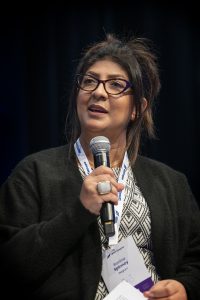
Rozina Spinnoy agreed that it is essential to bring different people and points of view to the table when organising sport and physical activity to create the most fruitful conditions for inclusion.
“We need to be seeing people like ourselves within boards, within leadership positions, within the clubs,” she said. “That sense of belonging, that sense of being part of a community. We really need to rethink the way we do things. We need to work in a more collaborative and community-oriented way where we are thinking about the society and the people around us.”
Co-designing activities and active spaces with empathy is a proven recipe for success, she concluded, so why not Restart with a commitment to include more people at all levels of sport?
“It’s already been proven by McKinsey [Global Institute] and various reports that the more diverse the input, the better the outcome, and I think that’s a principle we need to go by.”
Watch the full discussion panel ‘Rebuild: Inclusion in the ‘sportlight’ here



raffaella
great report Rachel! Move congress offers so many opportunities in different parallel moments and workshops/masterclasses… I have the chance to recuperate and follow what happened where I wasn’t able to be. And your report is perfect.
Rachel Payne
Thank you Raffaella!